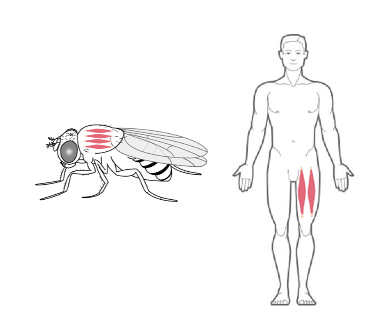Research projects

Telomere - DNA damage - Genome stability
Telomeres are nucleoprotein complexes that protect the extremities of chromosomes and maintain genome stability. Short or uncapped telomeres lead to chromosomal aberration and in some cases tumor development. Our current research showed that AKTIP, a Drosophila gene that encodes an E2-ubiqutin variant enzyme, plays a crucial role in aging processes. The AKTIP human homologue mediates proper telomere replication and has also a role in lamin-related processes, including those that govern nuclear architecture. Our working hypothesis is that loss of AKTIP causes chromatin alteration responsible for telomeric damage, and that this alteration might affect cancer progression.

Drosophila as model system for neuro muscolar diseases
Myotonic Dystrophy 2 (DM2) is a genetic multi-systemic disease, primarily affecting skeletal muscle. It is caused by CCTGn expansion in intron1 of the CNBP gene. Our studies are aimed at clarifying important and previously unresolved issues concerning the relative contribution of CNBP downregulation, CCUG-repeat toxicity and CCUG-repeat-encoded peptides in DM2. Interestingly, we revealed that depletion of Drosophila CNBP in muscles causes locomotor defects due to impaired polyamine metabolism. We found that the levels of ODC and polyamines are reduced upon dCNBP depletion, and most importantly in DM2 patients. Mechanistically, we provide evidence that dCNBP controls polyamine metabolism through regulating ODC translation.

Drosophila as model system for genetic primary microcephaly
Primary microcephaly is an invalidating condition characterized by a reduced number of neurons, resulting from alterations of the delicate balance between proliferation, differentiation and death. In the developing brain, the proteins encoded by MCPH genes are required for maintaining genome stability, ensuring a precise temporal order of gene expression patterns and maintaining a correct balance in cell fate commitment. We are studying whether DNA damage, apoptosis, altered chromatin organization, abnormal transcription profiles and altered differentiation are consequences of the reduced function of the known MCPH genes, as compared to other genes that have not yet been involved as causal factors.

Drosophila for understanding the aging dependent locomotor decline
Aging progressively modifies the physiological balance of the organism, increasing susceptibility to degenerative diseases. However, the interrelationship between the aging process and disease-causing genes is unknown. The ribonuclear protein TDP-43 has been implicated in the pathophysiology of ALS, with genetic mutations being linked to the neurological symptoms of the disease. We are studying the contribution of TDP-43 gene regulation during aging in locomotor abilities. Our preliminary data indicate that the decrease in fly locomotor activity during aging is due to the downregulation of TDP-43, caused by an increase in methylation of histone H3K9me3 on the promoter region. These results pinpoint a possible novel role for TDP-43 in the regulation of locomotory senescence and suggest that other modulators of this genetic trait may play a similarly role in the pathogenesis of ALS.
